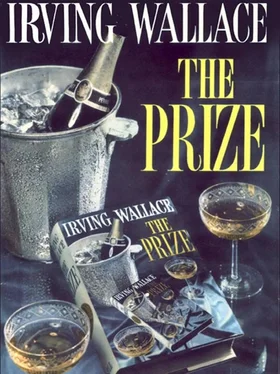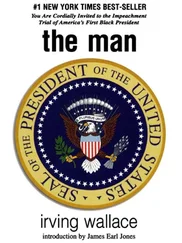
Dedicated to my parents Bessie and Alex Wallace
‘The whole of my remaining realizable estate shall be dealt with in the following way: The capital shall be invested by my executors in safe securities and shall constitute a fund, the interest on which shall be annually distributed in the form of prizes to those who, during the preceding year, shall have conferred the greatest benefit on mankind. The said interest shall be divided into five equal parts…’
– ALFRED BERNHARD NOBEL
November 27, 1895
‘The honours of this world, what are they but puff, and emptiness, and peril of falling?’
– SAINT AUGUSTINE
c. A.D. 400
Principal characters in order of appearance
COUNT BERTIL JACOBSSON – Assistant Director of the Nobel Foundation
DR. CLAUDE MARCEAU – Joint winners of the Nobel chemistry award
DR. DENISE MARCEAU
GISÈLE JORDAN – Balenciaga mannequin
MAX STRATMAN – Winner of the Nobel physics award
EMILY STRATMAN – His niece
DR. JOHN GARRETT – Co-winner of the Nobel physiology and medicine award
SARALEE GARRETT – His wife
DR. L. D. KELLER – American psychoanalyst
ANDREW CRAIG – Winner of the Nobel literature award
LEAH DECKER – His sister-in-law
LUCIUS MACK – Editor of the Weekly Independent
INGRID PÅHL – Members of the Nobel welcoming committee
CARL ADOLF KRANTZ
SUE WILEY – Reporter for Consolidated Newspapers
LILLY HEDQVIST – Swedish naturist
DR. CARLO FARELLI – Co-winner of the physiology and medicine award
RAGNAR HAMMARLUND – Swedish industrialist
DR. ERIK ÖHMAN – Swedish Medical researcher
DR. HANS ECKART – East German scientist
GUNNAR GOTTLING – Swedish writer
DARANYI – International agent
MÄRTA NOBERG – Swedish actress
OSCAR LINDBLOM – Swedish chemist
THE northern night had come early to Stockholm this day, and that meant that autumn was almost gone and the dark winter was near at hand.
For Count Bertil Jacobsson, as he walked slowly through the lamplit Humlegården park, his lion-headed brown cane barely brushing the hardened turf, it was a happy time, his favourite time of the year. He knew the promise of this cold premature night: the winds would come, and the mists sweep in from Lake Mälaren, and eventually, the snow and ice; and there would be no guilts about locking himself in his crowded, comfortable apartment, hibernating among his beloved mementoes of half a century, and working on his encyclopaedic Notes.
Emerging from the park, Count Bertil Jacobsson arrived at last on the pavement of Sturegatan. The evening’s constitutional was over, and the final exciting business of the night-the culmination of ten months of intensive and abrasive activity-would soon take place. For a moment, almost wistfully, he turned to look back at the park. To any other man, what had recently been so lush and green might now seem stark and denuded, the trees stripped of foliage and outlined grotesquely in the artificial light like gnarled symbols of life’s end in a surrealistic oil. But Jacobsson’s peculiar vision transformed the scene by some special alchemy to a kind of initiation of life, a nativity when nature was reborn, and the old year at last delivered of first life. Again, he told himself, his favourite season had arrived, and tonight, this night, would be a memorable one.
Turning back to the street, automatically glancing to the right and then to the left, and reassured that the thoroughfare was empty of traffic, Count Bertil Jacobsson began to cross it almost briskly, swinging his cane in a wide arc. When he reached the opposite pavement, he stood directly before the narrow six-storey building that was Sturegatan 14.
Tugging open one of the two towering metal doors-it had become more and more a feat of strength in recent years-he entered the Foundation building, and, as ever, felt warm and safe inside the dim hall that led to his office, his home, his museum, his life. Moving forward, he heard his leather footsteps on the marble floor, then paused briefly, as was his habit, before the giant sculptured bust of Alfred Nobel. Studying the sensitive, craggy, bearded face, Jacobsson was again unsure. Was this the way the old man had really looked, the way he remembered his looking, when Nobel was very old and he was very young? At last, with a sigh, he turned left, moved past the sign on the wall reading NOBELSTIFTELSEN, and with effort climbed the marble staircase to what American visitors persistently misnamed the second floor.
Opening and closing one of the glass-paned doors, Jacobsson again found himself in the reception corridor, with its familiar green carpet and rows of tables and chairs. Proceeding along the corridor, he noticed the bookcases on either side, those on the one side packed with investment journals (to which he constantly objected, no matter how often he was told that the Board’s primary job was one of finance), and those on the other side with expensively bound sets of Spanish, French, German and English works of the winners of decades past.
He could see Astrid Steen, his plump secretary, standing at an open file behind the counter of the reception office, her back to him.
‘Mrs. Steen-’
She turned quickly, dutifully, and he saw on her face the same sense of excitement that was mounting within him.
‘Are the telegrams ready?’ he inquired.
‘Oh, yes, sir-on your desk.’
‘Where is everyone?’
‘Up in the apartment. They are drinking your whisky, I’m afraid.’
He chuckled. Every year, the same.
‘For them, the job is over,’ Mrs. Steen added.
‘Not yet-not yet-’
‘The Foreign Office called. An attaché is on his way.’
‘Good. I shall be in my office.’
Count Bertil Jacobsson went into the Executive Director’s room, regretting his superior’s recent illness, but secretly pleased that as Assistant Director the task was wholly in his hands. He hastened through the small office, and entered his own even smaller office, in the adjacent room.
Removing his felt hat and wool overcoat, and carefully placing his cane in a corner, Jacobsson winked gaily at the portrait of his friend, old King Gustaf V, that hung on the facing wall. He saw the large manila folder on his desk, quickly took it, and then sat down heavily on the soft blue sofa.
With rising anticipation, he opened the manila folder. He was pleased that this year, at his suggestion-he could not remember that it had ever happened before-the Royal Academy of Science, the Caroline Institute, the Swedish Academy, and the Nobel Committee of the Norwegian Storting had all agreed to make their choices known to the world simultaneously. It would provide for greater drama, Jacobsson had argued, and he knew that he would be proved right.
Studying the contents of the open folder in his hand, he suddenly frowned. Quickly, he shuffled the typewritten telegram sheets for the one that was missing, and, then, he remembered. The Norwegian Storting had, just as it had sixteen times in the past, informed the Nobel Foundation that it would not give a peace prize this year. Recollecting the decision that had been transmitted yesterday, again he silently nodded his approval. This time for many things, but not for public accolades to peacemakers.
Gingerly, lovingly, he held up the first drafted telegram, and moved his lips as he read it to himself.
Читать дальше













